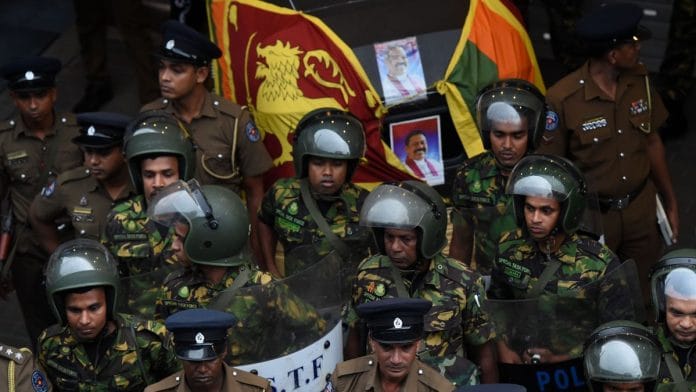As political chaos engulfs Sri Lanka, it is time for India to cautiously increase economic engagements with Colombo.
As New Delhi is busy tackling the fallout of the midnight drama in CBI, Colombo sprung a surprise Friday night when the all-powerful President of Sri Lanka Maithripala Sirisena dismissed his Prime Minister Ranil Wickremesinghe, and invited his nemesis Mahinda Rajapaksa to be PM. In a swift move, Sirisena’s party, the United People’s Freedom Alliance (UPFA), held a hurried meeting and decided to quit the ruling coalition alliance. Soon after that, President Sirisena unceremoniously dismissed his PM from the United National Party (UNP). The President also suspended parliament after Wickremesinghe called his dismissal unconstitutional and wanted to prove majority.
Interestingly, Ranil Wickremesinghe has the unique distinction of never completing his term in office.
The political chaos in Sri Lanka has led to the loss of lives after violence erupted on the island nation. The sacked Prime Minister is crying foul and claimed in a press conference that he continues to be the PM, sparking a constitutional crisis of sorts. Governance in Colombo with two supposed prime ministers has come to a standstill. The Sri Lankan speaker’s decision to recognise Ranil Wickremesinghe as PM and question President Sirisena for shutting parliament has led to further turmoil. With beefed up security and the politically active Buddhist clergy getting restless, the crisis is likely to escalate if not handled with due care and alacrity.
Also read: As Rajapaksa, the man India helped oust in 2015 becomes Sri Lanka PM, New Delhi watches and waits
The 2015 parliamentary elections in Sri Lanka brought two parties to the fore with a narrow difference of eleven seats. There was no alternative for both Sirisena’s UPFA and Wickremesinghe’s UNP but to come together to keep strongman Mahinda Rajapaksa out of power. Sirisena promptly promised to undo the provisions that vested extreme powers to the president of Sri Lanka, most of them bestowed on the post when Rajapaksa was himself occupying it for ten years from 2005 to 2015. The nineteenth amendment (19A) passed by parliament on 28 April 2015 and restored most of the powers of governance back to the prime minister thereby making him as powerful as the president. This was done to clip the wings of the president, in other words, limit the powers in the unlikely event of Mahinda Rajapaksa returning to power.
Ironically, shrewd politician Rajapaksa, hailing from the rural area of the port town of Hambantota in southern Sri Lanka, will now enjoy all the powers that he was supposed to be denied if he became the president.
The current National Unity Government, the first of its kind in Sri Lanka, was touted as a unique model promising to last its full term. The coalition between UNP and UPFA led by Sirisena was supported by the Tamil National Alliance also as the Tamils wanted to keep Rajapaksa out. After all, it was he who had decisively and brutally finished the terror group LTTE and projected himself as the one who saved the Indian Ocean island from being partitioned.
Also read: These images show how strongly China has Sri Lanka in its grip
One of the longest-running feuds, which had turned into a terror module claiming not only the lives of Tamil leadership and both the Tamil and Singhalese local population but also that of an Indian Prime Minister, was finally vanquished by Rajapaksa. But he paid a heavy price in terms of local political loss and a great loss of face internationally. Besides the allegations of army atrocities and civilian deaths (which Rajapaksa claimed as collateral damage due to use of civilians as human shield by the dreaded LTTE), the long list of charges of corruption and nepotism came to haunt the former president forcing him to lie low. Besides, New Delhi was enraged as Rajapaksa was seen to be tilting closer to China, although he claimed, and rightly so, that it was his government that cancelled some of the prime infrastructure projects awarded to China and diverted them to India.
Not the one to keep aloof, Rajapaksa quietly worked his way to garner political support at the grassroots. The Sri Lanka Podujana Peramuna, a political outfit supported by him, won a landslide victory in the 2018 local body elections gaining 239 seats out of the total of 340 seats, thus registering a grand comeback.
Also read: The Sri Lankan who solved a maths problem for Jeff Bezos & gave the world Amazon
The constitutional amendments which effectively prevented Mahinda Rajapaksa from getting closer to power, however, have some loopholes too. Though he cannot run for the presidency, he can support a candidate of his choice to run for the post and remain prime minister till the time his nominee decides to resign for whatever reason. In such an event, the prime minister has to step in and function as the president as well after which time he could probably amend the constitution to his advantage.
While New Delhi should wait and watch the changing dynamics, it should also hasten, albeit cautiously, to firm up economic engagements with Colombo without anchoring on the past.
The author is former editor of ‘Organiser’.






